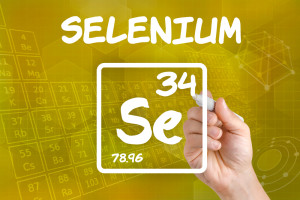Written by Greg Arnold, DC, CSCS. Participating subjects, who supplemented with 200 micrograms of selenium for 3 months, saw a significant 71.6% reduction in thyroid peroxidase antibodies, a hallmark of Hashimotos disease.
 Selenium is a trace element found mostly in plant foods that possesses significant antioxidant properties due to high levels of “selenoproteins” (1). These selenoproteins help protect cells against oxidative stress (2), maintain healthy inflammation levels (3), maintain digestive health in women (4), muscle strength in the elderly (5), and even help decrease mortality risk in the elderly (6).
Selenium is a trace element found mostly in plant foods that possesses significant antioxidant properties due to high levels of “selenoproteins” (1). These selenoproteins help protect cells against oxidative stress (2), maintain healthy inflammation levels (3), maintain digestive health in women (4), muscle strength in the elderly (5), and even help decrease mortality risk in the elderly (6).
Selenium may also help patients with a thyroid disorder called Hashimoto’s thyroiditis, the most common thyroid disorder. This disorder causes the body to attack the thyroid gland (called an “autoimmune disease”) (7) that eventually leads to thyroidal damage and inflammation (8). While the current approach to treating Hashimoto’s is with a medication called levothyroxine, a natural adjunctive treatment for thyroid health may be selenium.
In a 2010 review (9), researchers analyzed six studies of 339 subjects (9 men, 330 women) with Hashimoto’s thyroiditis that involved treatment with levothyroxine and selenium. Of the six studies, four were prospective, blinded, randomized, and placebo-controlled (10, 11, 12, 13), while one was open labeled (14) and another uncontrolled (15).
The researchers found that Hashimoto’s patients supplementing with selenium (200 micrograms/day) for 3 months had 71.6% lower levels of proteins called “thyroid peroxidase autoantibodies” which are a hallmark of Hashimoto’s disease (120.19 versus 421.98 International Units/milliliter, p < 0.0001) compared to the placebo group. In addition, those supplementing with selenium while on levothyroxine were 179% more likely to “report an improvement in well-being and/or mood compared with controls (p = 0.016). No further benefit from selenium supplementation was observed after 3 months of supplementation.
For the researchers, “On the basis of the best available evidence, selenium supplementation is associated with a significant decrease in thyroxine peroxidase autoantibodies at 3 months and with improvement in mood and/or general well-being” and that “An improvement in thyroid function and morphology should be demonstrated before selenium routine supplementation can be recommended in the treatment of Hashimoto’s thyroiditis.”
Source: Toulis KA. Selenium supplementation in the treatment of Hashimoto’s thyroiditis: a systematic review and a meta-analysis. Thyroid 2010 Oct;20(10):1163-73. doi: 10.1089/thy.2009.0351
© Mary Ann Liebert, Inc.
Posted September 22, 2016.
Greg Arnold is a Chiropractic Physician practicing in Hauppauge, NY. You can contact Dr. Arnold directly by emailing him at PitchingDoc@msn.com or visiting his web site at www.PitchingDoc.com.
References:
- “Trace elements: Selenium” posted on the CDC website
- Bellinger FP, Raman AV, Reeves MA, et al. Regulation and function of selenoproteins in human disease. Biochem J 2009;422:11–22
- Hatfield DL, Tsuji PA, Carlson BA, et al. Selenium and selenocysteine: roles in cancer, health, and development. Trends Biochem Sci 2014;39: 112–20
- Hughes DJ. Selenium status is associated with colorectal cancer risk in the European prospective investigation of cancer and nutrition cohort. Int J Cancer 2015 Mar 1;136(5):1149-61. doi: 10.1002/ijc.29071. Epub 2014 Jul 21.
- Fulvio Lauretani, Richard D Semba, Stefania Bandinelli, Amanda L Ray, Jack M Guralnik, and Luigi Ferrucci. Association of low plasma selenium concentrations with poor muscle strength in older community-dwelling adults: the InCHIANTI Study. Am J Clin Nutr 2007 86: 347-352
- Alehagen U. Relatively high mortality risk in elderly Swedish subjects with low selenium status.Eur J Clin Nutr 2015 Jun 24. doi: 10.1038/ejcn.2015.92. [Epub ahead of print]
- Chiovato L, Bassi P, Santini F, Mammoli C, Lapi P, Carayon P, Pinchera A 1993 Antibodies producing complementmediated thyroid cytotoxicity in patients with atrophic or goitrous autoimmune thyroiditis. J Clin Endocrinol Metab 77:1700–1705
- Pearce EN, Farwell AP, Braverman LE 2003 Thyroiditis. N Engl J Med 348:2646–2655
- Toulis KA. Selenium supplementation in the treatment of Hashimoto’s thyroiditis: a systematic review and a meta-analysis. Thyroid 2010 Oct;20(10):1163-73. doi: 10.1089/thy.2009.0351
- Gartner R, Gasnier BC, Dietrich JW, Krebs B, Angstwurm MW 2002 Selenium supplementation in patients with autoimmune thyroiditis decreases thyroid peroxidase antibodies concentrations. J Clin Endocrinol Metab 87:1687–1691
- Duntas LH, Mantzou E, Koutras DA 2003 Effects of a six month treatment with selenomethionine in patients with autoimmune thyroiditis. Eur J Endocrinol 148:389–393
- Karanikas G, Schuetz M, Kontur S, Duan H, Kommata S, Schoen R, Antoni A, Kletter K, Dudczak R, Willheim M 2008 No immunological benefit of selenium in consecutive patients with autoimmune thyroiditis. Thyroid 18:7–12
- Turker O, Kumanlioglu K, Karapolat I, Dogan I 2006 Selenium treatment in autoimmune thyroiditis: 9-month followup with variable doses. J Endocrinol 190:151–156.
- Gartner R, Gasnier BC 2003 Selenium in the treatment of autoimmune thyroiditis. Biofactors 19:165–170
- Mazokopakis EE, Papadakis JA, Papadomanolaki MG, Batistakis AG, Giannakopoulos TG, Protopapadakis EE, Ganotakis ES 2007 Effects of 12 months treatment with L-selenomethionine on serum anti-TPO levels in patients with Hashimoto’s thyroiditis. Thyroid 17:609–612
